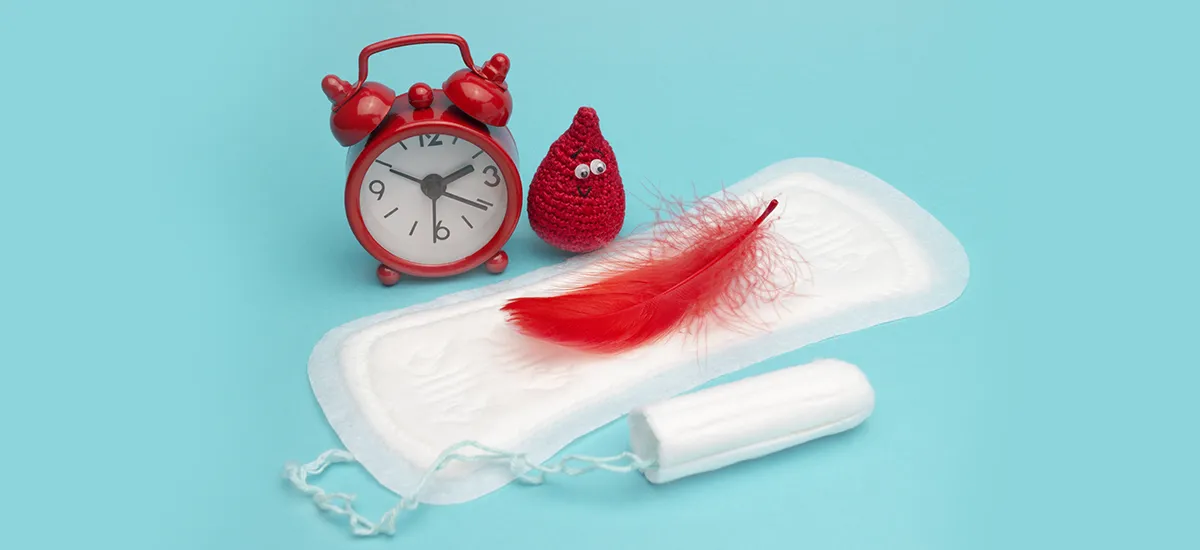Hormones affect everything from energy levels to mood and sleep patterns. Hormone intelligence is learning to comprehend the messages hormones send in the form of physical and emotional symptoms.
Having hormone intelligence puts you in the driver's seat of your health journey. By understanding your body's signals, you can -
· Take proactive measures for health management.
· Detect any potential imbalances early.
· Improve well-being across physical and mental aspects.
Understanding hormone fluctuations is not rocket science. If you know which symptoms are associated with which hormones, you can easily spot the hormonal imbalance in women.
· Energy levels
If you feel on top of the world one day and extremely sad the other, estrogen and testosterone are to blame. High levels of these hormones cause euphoria. But when their levels drop, you might feel sad, anxious, or depressed.
· Mood swings
From laughing hysterically to crying your heart out without realizing what happened is an excellent example of hormonal imbalance in women. A drop in estrogen and progesterone hormones can cause that switch.
· Sleep patterns
Cortisol and melatonin hormones are responsible for regulating your sleep patterns. Cortisol is a stress hormone whose levels are highest in the morning. They decrease as the evening approaches.
Melatonin, on the other hand, triggers sleepiness. Its levels are highest at night. If you constantly feel drowsy during the day, there could be an imbalance of cortisol and melatonin.
· Appetite changes
Hormones ghrelin and leptin are responsible for sending the ‘you are hungry’ message. Ghrelin is the hunger hormone that increases your appetite, while leptin decreases it.
Obese people develop a kind of resistance to leptin, so they hardly know they are not hungry or they shouldn't eat. Also, excessive levels of leptin can lead to diseases like anorexia (An eating disorder in which people starve themselves or exercise too much because of fear of gaining weight).
Impact of hormonal imbalance
Picture this—you're feeling sluggish, your jeans suddenly fit, and you're battling a case of the blues. Does that sound familiar? Hormonal fluctuations can cause all of this and affect your mental, physical, and sexual health.
Some of the common hormonal imbalance symptoms are -
· Physical health - You might experience weight gain or loss, fatigue, dizziness, headaches, acne breakouts, excessive hair growth, etc.
· Mental health - Feeling overwhelmed, depressed, anxious, sudden changes in mood, difficulty remembering things, and having trouble concentrating can also be associated with hormonal imbalance in women.
· Sexual health - Some people experience an increase or decrease in libido, infertility issues, erectile dysfunction (in men), vaginal dryness (in women), and difficulty enjoying sexual activities.
Note - This is not an exhaustive list. Symptoms can vary from individual to individual and the type of hormonal imbalance in women.
Role of hormones through life stages
Hormones play varied roles throughout life, from puberty to menopause (in women) or andropause (in men). Here’s a glimpse into hormone fluctuations during these stages.
· Puberty (for children)
Children aged 8 to 13 years undergo the puberty phase. Testosterone levels start increasing in boys. As a result, facial hair growth, deepened voice, bulking of muscles, acne, etc., is seen. Estrogen levels start rising in girls. They experience acne just like boys, along with the development of breasts and widening of hips.
Both boys and girls might feel self-conscious or more confident—it gets very confusing. Parents complain about mood swings and irritability in their children. You might even find yourself attracted to someone—that's a natural part of puberty.
· Menstrual cycle (for women)
Here’s a breakdown of the hormone imbalance in women during different menstrual cycle phases.
· Estrogen and progesterone hormone levels start to rise just after periods, and your mood starts to improve. This is the follicular phase.
· In the ovulation phase, the ovaries release an egg into the uterus, accompanied by the highest level of estrogen. This is the time when you feel the most happiness and are in the best spirits.
· The next phase is the luteal phase, in which progesterone levels are at their highest. This leads to a mellowing down of mood.
· Then comes the menstruation. You get your period. Both estrogen and progesterone levels drop drastically. You might feel depressed, sad, or anxious.
· Pregnancy and childbirth (for women)
Pregnancy triggers a surge of human chorionic gonadotropin (hCG) hormone. Estrogen and progesterone levels are also the highest. Hormone prolactin levels start rising as the delivery date approaches. It facilitates the production of breast milk after childbirth. During delivery, oxytocin and adrenaline levels are very high. Which gives mothers the energy to go through the birthing process without freaking out a lot.
· Perimenopause and menopause (for women)
Estrogen and progesterone levels start gradually decreasing after women enter their late 40s or early 50s. Women are about to cross their childbearing age. This is when perimenopause starts.
Harsh physical and mental symptoms accompany hormonal imbalance in women. Hot flashes, uncontrollable sweating, restless sleep, irregular periods, and increased libido are just a few of those. And there's a rollercoaster ride of emotions, just like in puberty.
After a few years, women completely cease having periods and enter the menopause stage. Vaginal dryness, cardiovascular risks, and bone density loss usually accompany this.
· Andropause (for men)
Just like menopause in women, there's andropause in men. Testosterone levels gradually decrease, and that leads to lowered libido, erectile dysfunction, lower energy levels, fatigue, and a decrease in muscle mass.
Lifestyle hacks for hormone balance
It all boils down to lifestyle choices when you talk about managing hormonal imbalance symptoms. A balanced diet, regular exercise, stress management, and prescribed medications can help maintain a balanced life through all stages of life.
Every person has unique needs when it comes to these choices. You must talk to your doctor about the best ways to tackle these symptoms. Don't do any random things without consulting your doctor, or you might end up doing the opposite of good.
At any point that you feel your symptoms are out of your control, immediately seek medical attention.
Here are some very generalized guidelines that can help in every phase of your life.
· Diet and nutrition
Quit junk food - can't stress that enough. Eat a balanced diet with essential nutrients, vitamins, minerals, carbohydrates, and healthy fats.
Carrots, milk products, nuts, and seeds have abundant vitamins. Essential minerals are present in green leafy vegetables and fish like salmon and sardine. Whole grains like wheat, oats, and brown rice have carbohydrates. Get healthy fats from avocados, olive oil, and fatty fish like tuna and mackerel.
· Exercise
Move your body as much as you can. You get a boost of adrenaline after exercising, which is good for keeping you in a good mood. You don't have to do vigorous training every day. Simply go for a run, take a walk in your area, or do surya namaskar in the morning.
· Sleep
Netflix and chill is not chilling if you do it at 1 a.m. A proper sleep routine is essential to prevent erratic behavior. Try to get at least 7 hours of sleep no matter how busy you are. Or you are going to end up causing an imbalance in cortisol and melatonin levels.
· Stress management
There's no ideal technique for stress management. People recommend meditation and yoga a lot. But pick an exercise that helps you relax. It can be painting, carpentry, listening to music, or going for a walk. The end goal is to manage your stress levels.
By developing hormone intelligence, you can understand the signs of your body. You can take charge of what’s needed to prevent or manage the associated symptoms. Wherever you experience something out of the ordinary, note it down. Keep account of all the changes. If you see a pattern in your behavior, you can take proactive measures to prevent it. Women can use period tracking apps to estimate their ovulation time and date of the next period. You can also design a healthcare plan. It can include a list of different doctors, schedules for your upcoming check-ups and screenings, a list of your medications, etc. Consider buying health insurance to support your medical expenses.

Ayushman Bharat, launched in 2018, is one of India's most ambitious healthcare initiatives. It provides accessible and affordable healthcare to millions of citizens across the nation. A...
Read More
Are you giving your breast health the attention it deserves amid your busy schedule? Important, yes, but often overlooked amidst a busy schedule. Simple breast care and...
Read More
Pain and discomfort are indeed a part of the package of being a woman but they can be managed through information and medical help. Women's health awareness...
Read More
Menstruation is a natural biological process experienced by all women. And, as we all know, it is often shrouded in secrecy and stigma. However, understanding and maintaining...
Read More
Have you ever felt like your emotions are on a rollercoaster ride at certain times? It could be your hormones! Hormonal fluctuations play a powerful role throughout...
Read More
Migraine headaches are a prevalent neurological condition often characterised by intense throbbing pain on one side of your head, accompanied by nausea, vomiting, and sensitivity to light...
Read More
Bringing new life into the world is undeniably one of the most miraculous journeys a woman can embark upon. It's a profound blend of joy, anticipation, and...
Read More
Invisible yet insidious, air pollution is a stealthy threat that weaves itself into the very breath we take. It's a cocktail of harmful gases and particles that...
Read More
Water is the elixir of life. Yet, polluted water can steal the well-being of millions, particularly women and girls. The effects of water pollution are far beyond...
Read More
Starting a family is one of the best feelings in the world. Unfortunately, some women face challenges when trying to start a family. But why is that...
Read More
Section 80D of Income Tax is an important provision for claiming health insurance tax benefits for individuals and families (including Hindu Undivided families, i.e., HUF). It provides...
Read More
A zillion questions pop in the head as soon as you get the good news. What should I eat? What should I avoid? Work life balance? Should...
Read More
Regarding health insurance, top-up and regular health insurance plans are two prevalent options. While both provide coverage for medical expenses, there are some important differences. Regular health...
Read More
What is the Mahatma Jyotiba Phule Jan Arogya Yojana? The Mahatma Jyotiba Phule Jan Arogya Yojana (MJPJAY) is a health insurance policy run by the Maharashtra government...
Read More
World Cancer Research Fund Internation found around 18.1 million cancer cases globally in 2020. Of these cases, 9.3 million were linked to men, and 8.8 million were...
Read More
Picture this: It's a cosy Sunday morning, and you're curled up with a cup of coffee, scrolling through your social media feed. Amidst the clothing videos and...
Read More
In today's dynamic world, navigating the complexities of health insurance can be daunting for many of us. This is where HIPAA comes into the picture. HIPAA stands...
Read More
Women's mental health is a complex dance between societal expectations and biological changes. Societal pressures to be perfect caregivers and achieve career success can create overwhelming stress....
Read More
It is a relief when your period shows up on time, but sometimes you wish it came sooner rather than later. Sometimes, you are thinking, "How can...
Read More